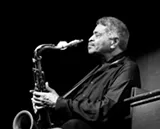In the early 1960's, after saxophonist George Coleman had earned his way to the top of the jazz world playing with Booker Little, Max Roach and Slide Hampton, he was tapped by Miles Davis to play in one of the greatest quintets in the history of jazz.
Coleman recorded four seminal albums with Davis: "Seven Steps to Heaven," "My Funny Valentine, "Four," and "Miles Davis In Europe."
But, while Coleman was at the pinnacle of his career, jazz was at the crossroads between bebop and the avant-garde. That tension would prove to be a turning point for Coleman.
His career began in the early 1950's in Memphis when his brother bought a saxophone and they both started playing it. George progressed quickly, inspired by jazz greats like Charlie Parker, Sonny Stitt, Sonny Rollins and John Coltrane, but he started his career in rhythm & blues.
Enlisted by B.B. King while still a teenager, Coleman learned from older musicians. By 18, he was writing arrangements for Ray Charles.
One hallmark of Coleman's playing, especially his spectacular solos, is circular breathing, which allows him to play more notes than seem possible.
"It's simple but you have to learn how to execute it," Coleman says. "You store the air in your checks and it works like bellows, like a balloon. As you expel the air from your mouth, blowing into the horn, you simultaneously inhale through your nose."
Coleman is modest about the quintet he played in with Davis. He prefers an earlier incarnation of Miles's band - with Coltrane on sax, drummer Philly Joe Jones, pianist Red Garland, and Paul Chambers on bass.
But many aficionados prefer the 1963-64 band with Coleman and a new generation of players. Behind the scenes, there was turmoil. "Ron Carter, Herbie Hancock, and Tony Williams didn't like my approach to music," Coleman says.
The legendary bassist, pianist and drummer thought Coleman was old-fashioned, playing bebop. "They would turn up their noses at me. They knew I could play, but these were the young lions. They wanted to play some avant-garde, so-called hip stuff at that time.
One night at The Jazz Workshop, a San Francisco club, Coleman had had enough.
"I said to myself, I'm tired of these guys turning their noses up and trying to be so hip," Coleman says. "I'll show these idiots that I can play this bullshit". Even Davis was surprised.
"I played around the harmony a little bit, some different stuff. Man, it shocked them. They turned around - all three of them. Miles rushed up to the bandstand: 'What the f- was that?' That night, I proved my point. Then I went right back to my stuff. I did it to get them off my back."
Another cause of tension was that some fans actually mistook him for Davis, even though they did not look alike.
"When we played the [Village] Vanguard, Miles would play one set and leave," Coleman says. "He'd put his trumpet on the piano and leave it there till the next night. So I was there with those guys. They resented me, and I was out front. I was forced to be the leader because there was nobody to kick off the tunes but me. People ask, 'Why'd you leave Miles?' That's why - it was stressful."


